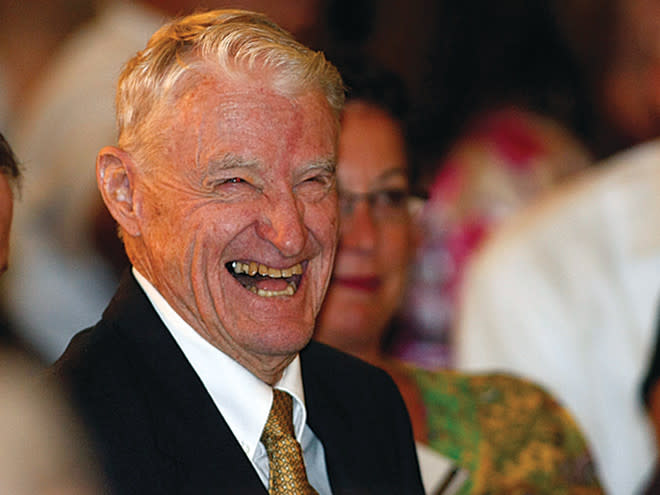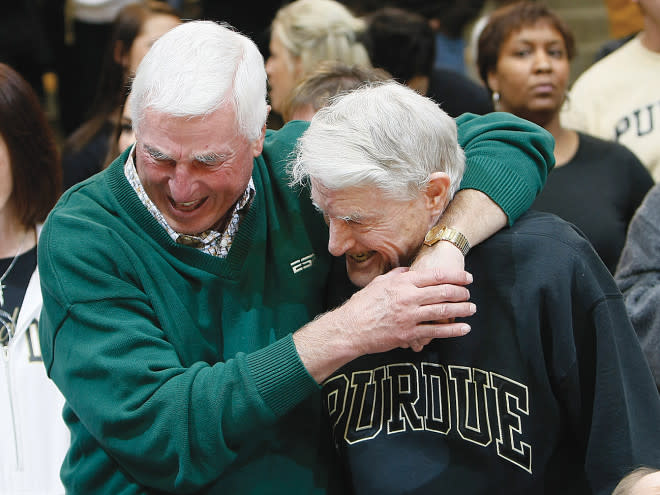The hand behind Purdue's Cradle passes

Len Dawson, Bob Griese, Mike Phipps.
A trio of football Hall of Famers either at the college or pro level, or both in the case of Griese.
But the man who got their careers jump started? The answer is simple, it's Bob DeMoss.
And because of that, DeMoss, who died Sunday at the age of 90, should be remembered at the highest of Boilermaker football royalty. His passing is noted, because his role in producing the thing Purdue football is most known for on a national scale — it's quarterback tradition — is not just significant, it is transcendent.
DeMoss might not belong on Purdue's Mt. Rushmore of its football legends, but if there was a Mt. Rushmore for contributors to Boilermaker football, DeMoss' smiling face should be chiseled in stone.
When you look at the Purdue football history timeline of quarterbacks, it usually begins in 1945 with DeMoss. That's the year when a spindly youngster from Dayton, Ky., jumped off the train in Lafayette and was thrust into a role as Purdue's starting quarterback as a freshman. And just a handful of weeks into his college career, he helped deliver one of the great upsets of the time in college football, a 35-13 thrashing of Ohio State in Columbus.
He spent four years as the starter under center, a rare feat in its own right in those days, and he left as Purdue's passing king in just about every statistical category. After a brief tryout at pro football, he found himself back in West Lafayette as an assistant coach under Coach Stu Holcomb for the 1950 season.
One of his first pupils on the football field was a diminutive quarterback named Dale Samuels, who from that day forward became a life-long friend. Like DeMoss, Samuels engineered a great upset in his first season as a starter, ending Notre Dame's 39-game unbeaten string with a 28-14 win in South Bend in 1950. Four years later, it was Dawson who upset the No. 1-ranked Irish by the same score. Then it was Bernie Allen, Ross Fichtner, Ron DiGravio, lesser known names sure, though Allen had a Major League Baseball career that spanned a dozen years and Fichtner was a terrific NFL defensive back. DiGravio, a quarterback from Massachusetts, fell just short of getting Purdue to Pasadena during his tenure from 1961-63.
DeMoss developed them all.
But the man who would finally deliver Purdue to the Rose Bowl, Griese, was DeMoss' next student. And the work with Griese might have been some of DeMoss' best work.
DeMoss loved Griese's leadership and moxie as a quarterback, but not Griese's throwing motion. What happened next was vintage DeMoss. He brought in Cecil Isbell, a Purdue halfback in the 1930s, when halfbacks were the passers in the offense of the time, to look at Griese's delivery. Isbell saw a couple of Griese's passes and tweaked his throwing motion and the rest was history. Griese was a two-time All-American and led the Boilermakers to a 14-13 win over USC in the 1967 Rose Bowl. DeMoss was skilled in his own right at solving the problems of his players' technique. But he also possessed an important trait which would serve him well throughout his professional life. DeMoss seemed always willing to get help to solve the problem. Any problem. That was the case with Isbell, but in turn DeMoss was always quick to credit those who helped him.
"A lot of people want to credit me for fixing Bob's throwing motion, but it wasn't me, it was Cecil," DeMoss would say years later. "I think Cecil watched about two of Bob's passes, and said he was turning his wrist in. He fixed it and we we moved on. It was that simple, so simple I couldn't fix it."
Purdue was ahead of its time in the passing game, but it didn't "air it out" because DeMoss' offenses also relied on a solid running attack. Airing it out, in 1960s terms, would mean throwing it 30 times in a game. In fact, it wasn't until DeMoss' final season as quarterback coach — in today's verbiage DeMoss was the offensive coordinator — that the Boilermakers aired it out. In that season, Phipps threw the ball with a frequency that approached modern day numbers, amassing 2,700 yards in a 10-game season, a Big Ten record at the time.
Both Phipps and Griese were runner-ups in the Heisman Trophy balloting, and DeMoss went to his grave wondering how Oklahoma's Steve Owens (1969) and Florida's Steve Spurrier (1966) beat out his Boilermakers. But also in typical DeMoss fashion, he would find a way to only comment on how good his guys were and to purposefully not disparage the efforts of Owens and Spurrier.
"Our guys were really special players," DeMoss said of Griese and Phipps. "I just can't think of two guys in college football I would rather coach."
In fact, DeMoss just refused to talk negatively about his players. In one of the most infamous fumbles in Purdue history, one at the goal line by Boilermaker fullback Perry Williams that would have delivered Purdue to an undisputed Big Ten title in 1967, and would have kept Indiana out of its only Rose Bowl appearance, DeMoss was mute. An offensive lineman messed up on the play, allowing the IU defender to break free and pop Williams before he reached the end zone. DeMoss would never single out the player, or the play, as the reason for the loss. He just refused to do it.
"They are just kids playing a game, and sometimes things happen," DeMoss said in 2002 when asked about the play. "If anyone has to take responsibility, it is me, because I directed the offense. It's not on them."
When Coach Jack Mollenkopf stepped down after the 1969 season after posting a record 84 wins over 14 seasons, it was a foregone conclusion that DeMoss would get the head coaching job. After all, he had served as the acting head coach during Mollenkopf's illnesses, and twice earned national coach-of-the-week honors for his understudy work.
Whether it was a case of the Peter Principle, or not, things didn't work out as hoped for DeMoss as the head coach.
Read on after the image.

DeMoss did have his moments as the football program's leader. In his third game as the head man, the Boilermakers upset No. 3 Stanford in Palo Alto. It marks one of just two times in the past 50 years Purdue has beaten a top-five ranked team on its home turf. But there were a lot of disappointments, too.
Purdue finished 4-6 in 1970 and 3-7 in '71 after injuries and close losses decimated a team that looked promising earlier in the season. In '72, Purdue posted a 6-5 record, but it was a talented team, as there were three first-round NFL draft picks on it in Otis Armstrong, Dave Butz and Darryl Stingley, an total never reached before or after in Purdue football annals. Yet the Boilermakers couldn't get over the hump after an 0-3 start. Still, it had a chance to earn a Rose Bowl trip, but lost a heartbreaker at No. 3 Michigan when All-America running back Otis Armstrong slipped on the icy astroturf at the Big House while trying to go in for touchdown. Purdue had to settle for a field goal, and ended up losing 9-6.
After three years, DeMoss decided he had had enough of being the head coach, giving way to Alex Agase. It matters little at this point whether athletic director George King gave DeMoss a nudge or not — it is unclear — and DeMoss wouldn't lower himself to talk about it. He seemed happy to move to a position in King's athletic department, a spot that DeMoss held for another two decades before his retirement.
During his tenure in athletic administration, DeMoss was loyal to King and to his beloved Alma Mater. He was also loyal to his family of three children and wife Janet.
He always seemed comfortable that he had his time in the spotlight, and it was all OK. It was the same old happy "DeMo" in the office. He loved golf and was good at it. He loved arguing in a friendly way about Purdue's role in the athletic world. He shied away from publicly commenting on coaches that came after him, or quarterbacks for that matter. But he never lowered his interest level. He was always fixated on how "the kids," as he would call them, were progressing.
He was just supportive of his Boilermakers, win or lose. He took delight in watching Mark Herrmann earn All-America status and Jim Everett blossom into a top-flight college quarterback. He suffered quietly through the Fred Akers and Jim Colletto years, but became a fixture on Purdue's golf outing circuit, and visits to watering holes after those outings are also the ones of legend. If you knew DeMo, you know Bill's Tap on the way home from Lake County.
Read on after the image

Tom Campbell
I always sensed he had a quiet pride with guys like Drew Brees and Kyle Orton. They were part of the tradition he created, though DeMoss never really took credit for being the steady hand behind "The Cradle." But I do know Purdue's most recent trip to Pasadena in 2001 and the success of Orton to Taylor Stubblefield (the 98-yarder in case you have forgotten) at Notre Dame Stadium in 2004 brought a smile to his face. He had been there, he knew what it felt like, but he had a keen sense of knowing how to pass along the tradition ... quietly. DeMoss knew it was important, and my guess is he is pleased that new Boilermaker boss Jeff Brohm brings a quarterback mindset to Purdue football. Heck, DeMo isn't pleased, he is thrilled even as he looks down.
Yes, Bob DeMoss was a fun guy, who loved Purdue more than just about anybody. He was grateful for the opportunity it gave him as an 18-year old, and he never stopped being grateful for those experiences it offered for him and his family all the years that came after.
DeMoss' days have expired. But his impact on Purdue football shouldn't ever be minimized. And ever is a long time.
Membership Info: Sign up for GoldandBlack.com now | Why join? | Questions?
Follow GoldandBlack.com: Twitter | Facebook
More: Gold and Black Illustrated/Gold and Black Express | Subscribe to our podcast
Copyright, Boilers, Inc. 2017. All Rights Reserved. Reproducing or using editorial or graphical content, in whole or in part, without permission, is strictly prohibited.


